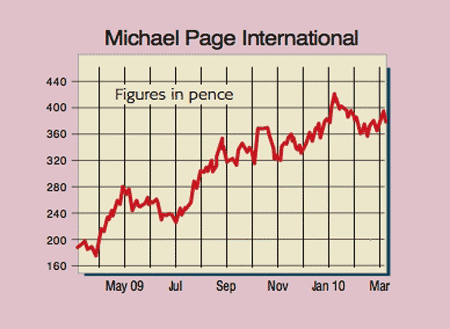Get the latest financial news, insights and expert analysis from our award-winning MoneyWeek team, to help you understand what really matters when it comes to your finances.
You are now subscribed
Your newsletter sign-up was successful
Want to add more newsletters?

Twice daily
MoneyWeek
Get the latest financial news, insights and expert analysis from our award-winning MoneyWeek team, to help you understand what really matters when it comes to your finances.

Four times a week
Look After My Bills
Sign up to our free money-saving newsletter, filled with the latest news and expert advice to help you find the best tips and deals for managing your bills. Start saving today!
Faced with collapsing order books in late 2008 and early 2009, companies managed to slash wage bills quickly and protect profits by making redundancies and cutting employees' hours.
The big question now facing shareholders in recruitment agencies such as Michael Page a firm heavily reliant on fees from permanent placements (71% of gross profits) is will recruitment bounce back?
And will those employees who have been put on part-time work be offered their full-time jobs again? If the answer is yes, then the firm could do very nicely given its global footprint (32% exposure to Britain, 47% to Europe, 12% to Asia and 10% to the Americas) and heavy weighting to the finance industry (50%). However, I'm not convinced.
MoneyWeek
Subscribe to MoneyWeek today and get your first six magazine issues absolutely FREE

Sign up to Money Morning
Don't miss the latest investment and personal finances news, market analysis, plus money-saving tips with our free twice-daily newsletter
Don't miss the latest investment and personal finances news, market analysis, plus money-saving tips with our free twice-daily newsletter
Most economists and international trade bodies predict that the West, burdened by gigantic fiscal deficits, will have to cut public-sector debt and spending. That will only add to dole queues. Doubts about the recovery's staying power will mean many companies will boost output by either offering extra hours to existing staff or taking on temporary staff.
Michael Page (LSE: MPI), rated a BUY by Deutsche Bank

So, given this muted backdrop, why have MichaelPage's shares doubled over the past 12 months? It is largely down to its operational gearing (high fixed costs boost profits when sales rise) and exposure to a very cyclical industry. This has attracted investors hoping that the FTSE rally has further to run from its March 2009 lows. There have even been unsubstantiated rumours going round that the firm may become a takeover target again, especially after rejecting advances from foreign rival Adecco at 400p back in 2008.
Michael Page is a decent business enjoying improving conditions in the recruitment market. At the preliminary results last Friday, chief executive Steve Ingham said that he had seen an increase in activity in all regions except in Great Britain. Speaking of the future, he then said: "Does it look like the sun is coming out? Yes." Nevertheless, even he had to conclude: "Does that mean that it's out forever? No."
The City is predicting 2010 sales and underlying earnings per share of £733m and 9.2p, rising to £881m and 15.9p in 2011. This puts the shares on pie-in-the-sky p/e ratios of 42 and 24. I would value the firm on a through-cycle Ebita multiple of ten, assuming a sustainable margin of 12%. After adjusting for £137m of net cash, I get an intrinsic value of just 310p per share. So, with the jobs picture set to worsen, particularly if central bank stimulus programmes are withdrawn towards the end of 2010, it's time to sell.
Recommendation: SELL at 385p
Paul Hill also writes a weekly share-tipping newsletter, Precision Guided Investments
Get the latest financial news, insights and expert analysis from our award-winning MoneyWeek team, to help you understand what really matters when it comes to your finances.
Paul gained a degree in electrical engineering and went on to qualify as a chartered management accountant. He has extensive corporate finance and investment experience and is a member of the Securities Institute.
Over the past 16 years Paul has held top-level financial management and M&A roles for blue-chip companies such as O2, GKN and Unilever. He is now director of his own capital investment and consultancy firm, PMH Capital Limited.
Paul is an expert at analysing companies in new, fast-growing markets, and is an extremely shrewd stock-picker.
-
 How should a good Catholic invest? Like the Vatican’s new stock index, it seems
How should a good Catholic invest? Like the Vatican’s new stock index, it seemsThe Vatican Bank has launched its first-ever stock index, championing companies that align with “Catholic principles”. But how well would it perform?
-
 The most single-friendly areas to buy a property
The most single-friendly areas to buy a propertyThere can be a single premium when it comes to getting on the property ladder but Zoopla has identified parts of the UK that remain affordable if you aren’t coupled-up